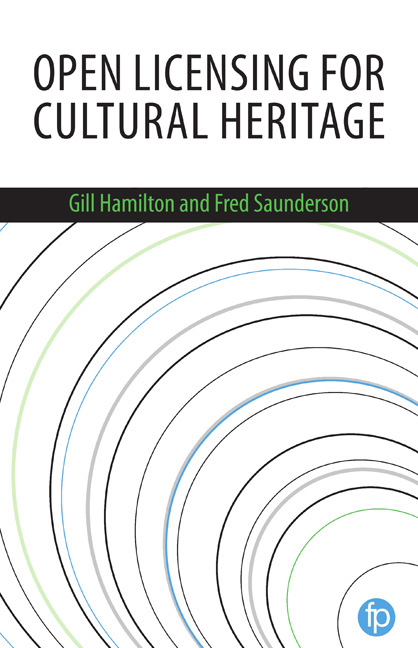Book contents
- Frontmatter
- Contents
- List of figures and tables
- Acknowledgements
- About the authors
- 1 Introduction
- 2 The open movement: its history and development
- 3 Copyright and licensing: a background
- 4 Open licensing: the logical option for cultural heritage
- Introduction to case studies
- 5 Small steps, big impact – how SMK became SMK Open
- 6 The British Library experience of open metadata licensing
- 7 Open policy and collaboration with Wikimedia at the National Library of Wales
- 8 Newcastle Libraries – the public library as a place to share culture
- 9 Developing open licensing at the National Library of Scotland
- 10 The Wellcome Library
- 11 Developing an open educational resources policy and open approaches to mitigate risk at University of Edinburgh
- 12 How to implement open licensing
- 13 Using and reusing openly licensed resources
- 14 Conclusion
- Index
10 - The Wellcome Library
Published online by Cambridge University Press: 08 June 2018
- Frontmatter
- Contents
- List of figures and tables
- Acknowledgements
- About the authors
- 1 Introduction
- 2 The open movement: its history and development
- 3 Copyright and licensing: a background
- 4 Open licensing: the logical option for cultural heritage
- Introduction to case studies
- 5 Small steps, big impact – how SMK became SMK Open
- 6 The British Library experience of open metadata licensing
- 7 Open policy and collaboration with Wikimedia at the National Library of Wales
- 8 Newcastle Libraries – the public library as a place to share culture
- 9 Developing open licensing at the National Library of Scotland
- 10 The Wellcome Library
- 11 Developing an open educational resources policy and open approaches to mitigate risk at University of Edinburgh
- 12 How to implement open licensing
- 13 Using and reusing openly licensed resources
- 14 Conclusion
- Index
Summary
Introduction
The Wellcome Library is one of the world's major resources for the study of medical history. We are primarily a special collections library, with a wide range of materials dating from ancient times to the present day. We embarked on a long-term mass digitisation programme in 2010, and over the past six years we have digitised – and worked with our partners to digitise – over 25 million images as well as hundreds of hours of digital video. We also collect born-digital archival and published works and clinical and biomedical digital imagery.
‘Good health makes life better. We want to improve health for everyone by helping great ideas to thrive.’ Guided by this core philosophy of the Wellcome Trust, of which we are a part, the Library's aim becomes clear: to create an environment for these great ideas to thrive. To do this we showcase a diversity of experiences of health across time and in different cultures and settings and make it possible for people to understand those experiences better. We can only achieve this by maximising the reach and impact of our collections.
‘Going digital’ is not enough – we must also ensure that all our digital assets are as open and accessible as possible, embracing the diversity in our audiences, and ensuring that we don't construct barriers where there need be none. This thread runs through everything we do – from collecting our materials, to describing, arranging and classifying them, to our user interface design and system development – and connects us to our users, their ideas and their creations. Open licensing is a key strategy to keeping this thread intact.
Unlocking 20th-century content
The limited availability of 20th-century material online – the so-called 20thcentury ‘black hole’– is a particular pain point for any cultural heritage institution wishing to open up its collections to a public audience (or any audience). This was the case before the EU Directive on Orphan Works and the UK implementation of the Orphan Works Licensing scheme, and it remains the case today. The risk to collection holders of orphan works are only a part of the problem.
- Type
- Chapter
- Information
- Open Licensing for Cultural Heritage , pp. 149 - 158Publisher: FacetPrint publication year: 2017



